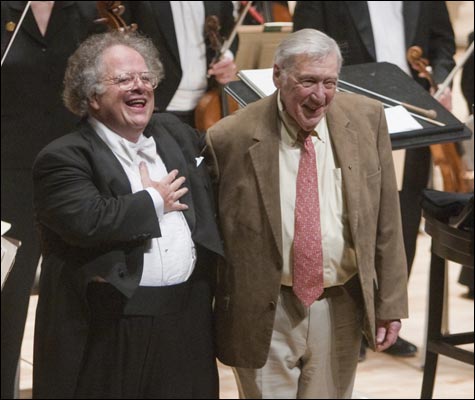
AFTER THE WORD ENDED: James Levine with Gunther Schuller after the premiere of Where the Word Ends. |
One of my most profound musical experiences took place when I was still a graduate student. A number of my fellow students were also classical-music lovers and record collectors, and we would occasionally get together to listen. I myself would be encouraged, especially by the salesmen at Sam Goody's, to buy the "definitive" version of any given piece — "definitive" meaning the salesman's favorite recording. But my friends were more sophisticated; they liked to compare different performances of the same work. I remember one particular session when each of us brought his favorite (in my case, it was also my only) recording of Mozart's Symphony in G minor, No. 40 — his penultimate symphonic work. The conductors were Arturo Toscanini, Wilhelm Furtwängler, Bruno Walter, and Otto Klemperer; except that the recordings included the same notes, they could have been of four different works. And they were all wonderful — powerful, convincing, memorable performances of a very great piece of music.
I was recalling this experience listening to James Levine and the Boston Symphony Orchestra play the G-minor and 11 other symphonies in a three-program Mozart "mini-festival." (I was out of town for the program with the very earliest symphonies and heard them rebroadcast on WGBH.) Levine's G-minor — the centerpiece of the last program, which included the other two symphonies in Mozart's uncanny final trilogy — was fast, urgent, energized, shapely, and, like all the symphonies, played with an impressive clarity of texture, even as the works themselves became increasingly multi-layered. Although his conducting didn't have Toscanini's driving intensity, or Furtwängler's nervous, almost neurotic interiority, or the depth of Klemperer's pathos, it had its own genuine if somewhat impersonal conviction in its understanding of the intent and structure of Mozart's mysterious score.

The three last symphonies make an especially good program because the contrasts are so pronounced: the autumnally pastoral E-flat, the poignant G-minor (every movement relentlessly in the minor), the dashing Jupiter, in which the classical symphony also absorbs Baroque polyphony. (In 1980, Kurt Masur made his BSO debut with this program, and he repeated it at Tanglewood in 2007.) I'd have preferred to hear even greater contrast among these works, more expansiveness, a more relaxed opening-out, and more of Mozart's sly insinuation. In the first movement of the Jupiter, Mozart quotes a jauntily sexy little aria, "Un bacio di mano" ("A Kiss on the Hand"), that he'd written for someone else's opera. Like most conductors, Levine didn't make this delicious moment any more playful than the rest, and he left out the quotation marks. In a way — which was not uninteresting — he played these symphonies as if they were parts of a single greater work.
Michael Steinberg's program note points out that since Mozart was only 32 when he composed these mature masterworks, they are still early works, even though he would live only another three years. The nine symphonies on Levine's two previous concerts Mozart composed between the ages of eight and 17, and only the last one, his other, "Little" G-minor Symphony, the dramatic No. 25, is a full-throated masterpiece, a breakthrough in invention, originality, and power. Three of these early pieces had never before been performed by the BSO, and none requires the deepest interpretive insights. Yet Levine and the players (in essence half the orchestra playing each concert, with numerous substitutes) lavished a loving tenderness and sweetness on all of them while maintaining their compositional backbone. You could hear anticipations of more familiar music. The exquisitely unfolding slow movement of the E-flat No. 19 foreshadows Susanna's sublime "Deh vieni non tardar" in the last act of Figaro. The unnumbered Symphony in G, the so-called Lambach, is a gem of melodic elegance. And everywhere are those passing minor-key shadows, the fingerprint of the later master of the subjunctive mood. Levine treated all these fledgling symphonies with respect and seriousness, without condescension. What pleasure! What a lovely note on which the maestro ended his fifth season with the BSO.
Before that, the Metropolitan Opera's leading Italian soprano, Barbara Frittoli (Amelia in the BSO's Verdi Simon Boccanegra the week previous), returned to revel in an elaborate late Mozart concert aria and a dramatic early aria on a Levine program that ended with Brahms's Symphony No. 2 and featured the premiere of Gunther Schuller's Where the Word Ends. Schuller completed this big orchestral commission two years ago, but Levine postponed it because he didn't think the BSO had enough time to prepare it. Some 105 players filled the extended Symphony Hall stage for this colorful, riveting, engaging 25-minute 12-tone extravaganza. Beautifully laid out and gorgeously scored, it's a single movement in four distinct sections, with a full Scherzo-and-Trio interrupting the "second-movement" Adagio. Schuller said he wrote it quickly, in a white heat. Schuller is at least as well known for his interest in jazz (he coined the term "third stream") as for his classical compositions, and Where the Word Ends is full of jazzy syncopations and woozy, bluesy passages for horn (Schuller's own instrument) right out of Gershwin or Ellington. My main reservation about the piece is that it leans too heavily on Stravinsky's Sacre du printemps, even to the point of being a kind of gloss, not only in its jagged and motoric rhythms but also in its sinuous, murmuring dream-like slow passages.